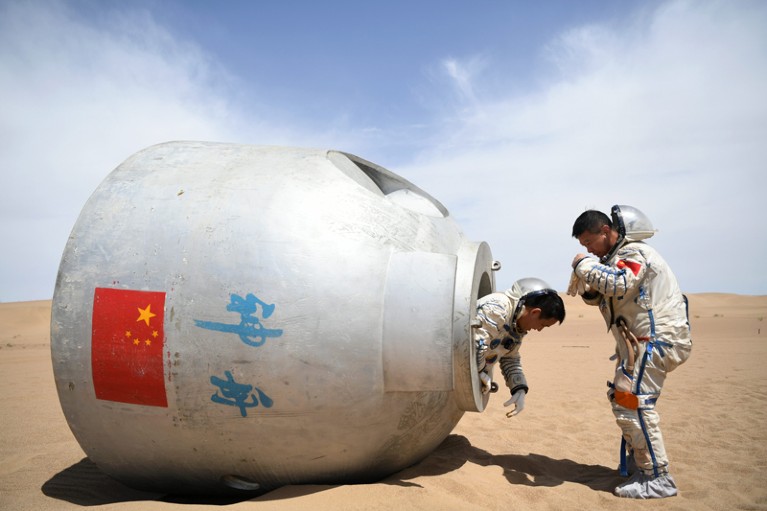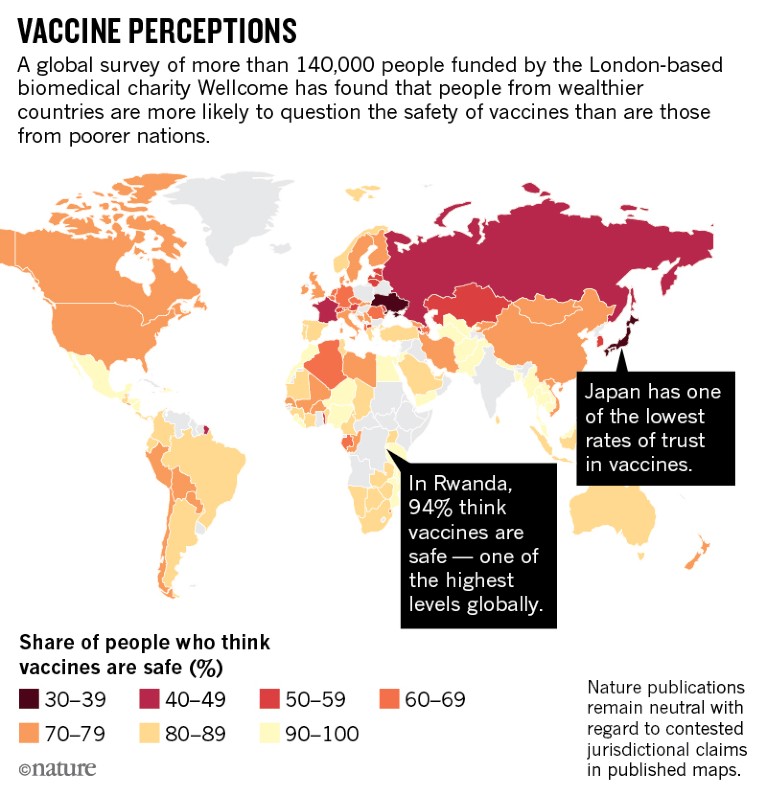EVENTS
Academics back Hong Kong protesters Hong Kong’s government has suspended an unpopular bill that would make it legal to extradite people to mainland China to stand trial or serve criminal sentences. The 15 June move was a response to huge protests that began more than a week ago. But the bill could still be revived, and protests continue, with critics demanding its withdrawal. More than 1,000 international academics have signed a petition against the proposed law, saying it would restrict free speech and academic debate, and erode personal freedoms. When the bill was introduced, Hong Kong chief executive Carrie Lam said it was meant to close a loophole that allows criminals to stay in the city, but critics say that mainland China — which does not have Hong Kong’s legal protections — would crack down on dissidents living in or visiting the city.

Hong Kong has seen major protests against a controversial law that would allow extradition to mainland China for some crimes.Credit: Geovien So/SOPA Images/LightRocket/Getty
Satellites lift off Three Canadian radar satellites that will monitor environmental changes in Canada and the Arctic launched on 12 June from Vandenberg Air Force Base in California. The long-awaited RADARSAT Constellation Mission will image areas of interest up to four times a day and will be able to track ships across the oceans in the north. The Canadian government, which will run the trio of spacecraft, approved the project in 2008, but the mission ran over budget and behind schedule. The first two RADARSAT satellites, which launched in 1995 and 2007, enabled the first high-resolution mapping the whole of Antarctica, among other things.
POLICY
Harassment study Several major US science agencies say they have received few reports of sexual harassment by the researchers whose work they fund, despite studies that have found such behaviour to be pervasive in US academic science. In some cases, agencies have turned to news reports to identify researchers under investigation by universities for such behaviour, according to a report released on 12 June by the US Government Accountability Office. NASA received three sexual-harassment complaints about its grant recipients between 2015 and 2019, the Department of Energy received two, and the Department of Health and Human Services — which includes the National Institutes of Health — received one. The National Science Foundation, which last year began requiring institutions that it funds to report any finding they make regarding sexual harassment by a grant recipient, received 14 complaints.
Genetics law China has announced a new law restricting the collection and use of genetic resources from people in the country — including biological samples that yield DNA, such as blood, and data gleaned from sequencing them. The law, which goes into effect on 1 July, formalizes restrictions on such activities that have been in place since 1998. Scientists working for foreign organizations will still need to collaborate with a domestic research organization to work with genetic material from Chinese citizens and to take DNA resources outside China, and such collaborations require the science ministry’s approval. Fines for unauthorized collection of genetic resources or data can be up to 10 million yuan (US$1.4 million).
Advice not wanted US President Donald Trump has signed an executive order that directs federal agencies, including science agencies, to reduce the number of advisory committees they support by one-third before the end of September. Agencies can no longer create advisory committees unless the total number of panels across the government is less than 350; currently, about 1,000 advisory committees provide the government with independent input on a plethora of scientific, environmental and health issues, among others. The Trump administration says the policy, enacted on 14 June, will increase government efficiency, but critics say that it will undermine the role of science in government decisions — and note that the administration has moved to restrict the influence of advisory committees at agencies including the Environmental Protection Agency. “It’s no longer death by a thousand cuts,” said Gretchen Goldman, an analyst at the Union of Concerned Scientists, an advocacy group in Cambridge, Massachusetts, in a statement. “It’s taking a knife to the jugular.”
SPACE
China space station China has selected nine scientific experiments to fly on its next major space station, scheduled for completion in 2022. The China Manned Space Agency chose the projects from 42 hopefuls, in a process organized with the United Nations. China’s existing space laboratory, Tiangong-2, also hosts experiments, but the new outpost — currently known as the China Space Station — will be bigger and longer-lasting (pictured, Chinese astronauts in training). The projects cover topics from astronomy and biology to the behaviour of fluids and fire in space. A European experiment will study how microgravity and radiation in space affect the mutation of human DNA, and a Russian–Indian experiment will study star formation by mapping the cosmos in ultraviolet light. Scientists working on the projects hail from nations that have space programmes, as well as countries such as Kenya, Mexico and Peru — the result of an effort to encourage participation from low- and middle-income countries. But the United States is not involved in any of the experiments. Since 2011, NASA researchers have been banned from collaborating with China without congressional approval.

Chinese astronauts are scheduled to have their own space station from 2022.Credit: Chen Bin/Xinhua/Zuma
CLIMATE CHANGE
UK climate goal Scientists have welcomed a commitment by the UK government to reduce net carbon emissions to zero by 2050. Draft legislation laid out in Parliament on 12 June would tweak the 2008 Climate Change Act, which sets an emissions-reduction target of 80% by 2050, compared with 1990 levels. Climate scientists praised the promise to raise that target to 100%, but they stress that the commitment is just the first step in ending the country’s contribution to climate change. “We need to see not only the legislation and the promises, but also action to make those promises real,” said Tim Kruger of the University of Oxford, UK. The move follows a May report from the Committee on Climate Change, an independent advisory body, which recommended the net zero target to meet the United Kingdom’s commitments to the 2015 Paris agreement. The draft law must now be approved by Parliament.
HEALTH
Ebola spread A five-year-old boy in Uganda who was infected with Ebola died on 12 June, according to the Ugandan ministry of health. The child was the first person to be diagnosed with the illness in the country since an outbreak of the virus emerged in the neighbouring Democratic Republic of the Congo (DRC) ten months ago. He had travelled from the DRC to Uganda with his family on 10 June, the World Health Organization (WHO) said. The Ugandan health ministry confirmed that the boy had tested positive for Ebola, as had his three-year-old brother and his grandmother, who also died. The WHO and Uganda’s health ministry have dispatched rapid-response teams to try to limit Ebola’s spread in the country. The Ebola outbreak in the DRC is now the second deadliest on record, with roughly 1,400 deaths. There had been more than 2,100 confirmed and probable cases of Ebola there as of 16 June, according to the WHO.
TREND WATCH
People living in wealthy countries are more likely to question the safety of vaccines than are those living in poorer ones, according to a worldwide survey on public attitudes to science and health. More than 140,000 people from around 140 countries gave their views on the safety and efficacy of vaccinations as part of an almost two-year project funded by London-based biomedical research charity Wellcome. The results of the Wellcome Global Monitor, published on 19 June, suggest that 79% of people worldwide agree, to some extent, that vaccinations are safe. Europe has some of the lowest levels of perceived safety, with just half of those in Eastern Europe and 59% in Western Europe strongly or somewhat agreeing with the statement “vaccines are safe”. Confidence is particularly low in France and Ukraine. By contrast, 97% of people in Bangladesh think that vaccines are safe, and that number remains high throughout South Asia. In East Africa, the figure is 92%. In some regions, greater scientific knowledge was associated with less confidence in vaccines, suggesting that providing information and education might not be enough to combat scepticism.
Source: Wellcome Global Monitor Source: Wellcome Global Monitor







